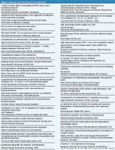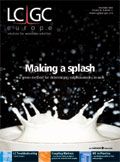Meeting Preview: ExTech and HTC-9
The Eighth International Symposium on Advances in Extraction Techniques (ExTech) highlights new extraction technologies for chemical and biochemical analysis in laboratory and on-site settings. Generally, the series focuses on solvent-free sample preparation including methods for rapid and selective enrichment prior to analysis and micro-sample preparation. Major emphasis will be placed on the fundamental understanding of extraction processes that result in greater selectivity and efficiency in method development and a rationalization of method selection for specific applications. On-site environmental methods and biomedical applications will be covered. The ExTech symposium series was initiated in 1999 by Professor Janusz Pawliszyn. The 2006 edition will focus especially on passive sampling methods, use of molecular imprinted polymers, biologically modified sorbents, novel coatings and sorbent material and will take place on 6–8 February at the Moat House Hotel, York.
The Eighth International Symposium on Advances in Extraction Techniques (ExTech) highlights new extraction technologies for chemical and biochemical analysis in laboratory and on-site settings. Generally, the series focuses on solvent-free sample preparation including methods for rapid and selective enrichment prior to analysis and micro-sample preparation. Major emphasis will be placed on the fundamental understanding of extraction processes that result in greater selectivity and efficiency in method development and a rationalization of method selection for specific applications. On-site environmental methods and biomedical applications will be covered. The ExTech symposium series was initiated in 1999 by Professor Janusz Pawliszyn. The 2006 edition will focus especially on passive sampling methods, use of molecular imprinted polymers, biologically modified sorbents, novel coatings and sorbent material and will take place on 6–8 February at the Moat House Hotel, York.
The Ninth International Symposium on Hyphenated Techniques in Chromatography and Hyphenated Chromatographic Analysers (HTC-9) will cover all fundamental aspects, instrumental developments and applications of the various hyphenated chromatographic techniques. For example, the coupling of GC or LC to LC, GC and SFC/SFE; MS, FTIR, AED and other techniques coupled with GC, HPLC, SFC, CZE, CEC and FFF; PTV-GC-MS; on-line air traps, purge- and trap, extractors and GPC-GC (or LC); LC to NMR, Raman, FIA-DAD, light scattering and ITP-MS. Emphasis will also be placed on sample introduction, miniaturization, microfabricated analytical devices and on the design of hyphenated, on-line and at-line chromatographic analysers. This bi-yearly symposium is the only one devoted to hyphenated chromatography and the 2006 symposium will take place on 8–10 February at the Moat House Hotel, York.

Table 1: Selection of preliminary oral contributions.
A one-day conference on endocrine disrupting chemicals will also feature on Wednesday 8 February 2006. This conference will highlight both the sample preparation problems and the analytical methodologies for the analysis of this chemically very diverse group of compounds and also toxicological aspects, risk aspects and the impact on life.
Internationally renowned speakers will give plenary lectures and keynote lectures and submitted oral presentations will be presented in two–three parallel sessions. Ample time will be available to discuss the posters.
The symposia will also include
- Half a day and one day short courses providing an entry to novices in to the field
- Tutorials to provide an overview of the basic principles, methods, developments and applications of a hyphenated chromatographic technique
- Discussion sessions on various topics
- A technical exhibition
- Product seminars.
During the HTC symposium, a "Lifetime Achievement Award", sponsored by LCGC Europe, will be presented. The criteria for the award will be "for outstanding achievements in hyphenated techniques in chromatography and for distinguished service to the international chromatographic community". The award will be presented during the closing session by Dr Hernan Cortes, president of the selection commitee and by David Hills, editor of LCGC Europe.
An HTC award, sponsored by Elsevier Science, will be presented to the most innovative paper or poster contribution of the conference. This award will be judged by an international jury under the chairmanship of Professor Sandra. The HTC-8 award will be presented during the closing session.
These symposia have been organized by the Royal Flemish Chemical Society (KVCV, Belgium) and the Chromatography and Electrophoresis Group (C&EG) of the Royal Society of Chemistry (RSC, UK).
Abstracts for poster presentations may be submitted until 15 December 2005. More information on the meeting and submission of papers can be obtained from
The Congress Secretariat
Ordibo bvba, Edenlaan 26
B-2610 Wilrijk
tel: +32 58 523116
fax: +32 58 514575
e-mail: htc@ordibo.be
Website: www.ordibo.bewww.ordibo.be/ (also for registration and hotel reservations).

Thermodynamic Insights into Organic Solvent Extraction for Chemical Analysis of Medical Devices
April 16th 2025A new study, published by a researcher from Chemical Characterization Solutions in Minnesota, explored a new approach for sample preparation for the chemical characterization of medical devices.
Sorbonne Researchers Develop Miniaturized GC Detector for VOC Analysis
April 16th 2025A team of scientists from the Paris university developed and optimized MAVERIC, a miniaturized and autonomous gas chromatography (GC) system coupled to a nano-gravimetric detector (NGD) based on a NEMS (nano-electromechanical-system) resonator.
Miniaturized GC–MS Method for BVOC Analysis of Spanish Trees
April 16th 2025University of Valladolid scientists used a miniaturized method for analyzing biogenic volatile organic compounds (BVOCs) emitted by tree species, using headspace solid-phase microextraction coupled with gas chromatography and quadrupole time-of-flight mass spectrometry (HS-SPME-GC–QTOF-MS) has been developed.
A Guide to (U)HPLC Column Selection for Protein Analysis
April 16th 2025Analytical scientists are faced with the task of finding the right column from an almost unmanageable range of products. This paper focuses on columns that enable protein analysis under native conditions through size exclusion, hydrophobic interaction, and ion exchange chromatography. It will highlight the different column characteristics—pore size, particle size, base matrices, column dimensions, ligands—and which questions will help decide which columns to use.












